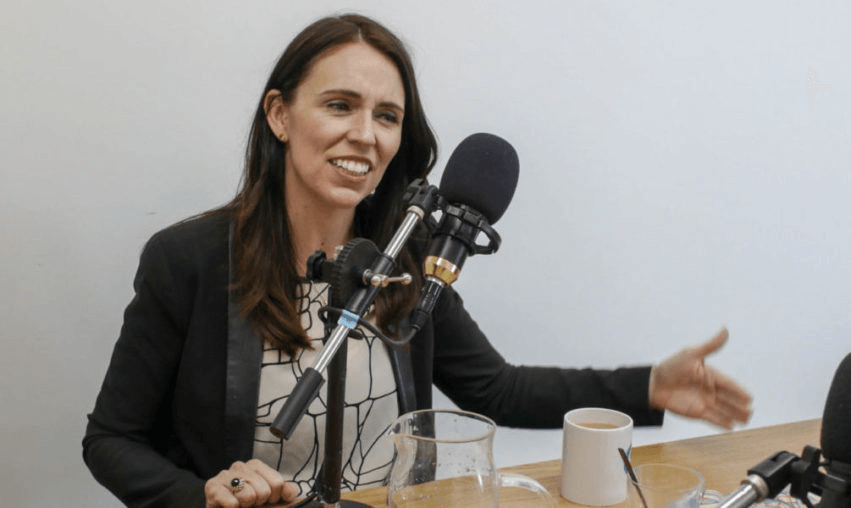The challenge is greater, because of the battle to get everyone on board, says the PM as part of a wide ranging interview with the Spinoff. And New Zealand’s methane emissions problem prompts a new analogy from Ardern: the moon landing
Jacinda Ardern says she has “upgraded my position” on her characterisation of climate change as her generation’s “nuclear-free moment”.
As part of a wide-ranging interview with the Spinoff, the prime minister said the challenge of climate change had one critical difference to the nuclear-movement. Then, “we were unified”, she said. “And yet what we’re doing on climate change – it is just that much harder, because it’s a call to action for everyone. And so I’m hoping we can get to the place of having that same unified moment that we had around nuclear free for climate change.”
It was an elaboration of a position she outlined in a speech to the One Planet Summit in New York last month. Then she identified the “stark difference between the nuclear free movement and climate change: unity”, adding: “In the past we were defined as a nation by the coming together for a cause, and now, as a globe, we need to do the same again. Not because of the benefits of unity, but because of the necessity of it.”
A few days after the release of the IPCC report which found that climate change could wreak catastrophe around the world as soon as 2040, Ardern told the Spinoff she remained hopeful that unity could be achieved.
“I feel at least positive that we’ve moved significantly from a debate that 10 years ago was whether or not climate change was real, now to a debate about how much we need to do and how quickly. Ten years ago I got booed at a public meeting for talking about climate change. When I first came in to parliament, a select committee was established to look at the science of climate change. So now to have moved to where I’m still hopeful that we’ll get political support from across the house for a Zero Carbon Bill – I hope – that’s a big shift. So let’s feel positive about that.”
Ardern rejected the suggestion that her focus last week on ensuring petrol was more affordable provided a jarring contrast to the crisis of climate change laid out by the IPCC.
“Looking at New Zealand’s emissions profile, the biggest challenge for us actually sits in agriculture,” she said.
There was nevertheless work to be done on New Zealand’s transport emissions profile, she said.
“That’s why the [road] excise that we generate is going into alternatives like for instance public transport options, rail to the [Auckland] airport, significant transport infrastructure that needs to be built. That’s why we have things like our excise. But at the same time it needs to be a transition, and I can’t deny that at the moment, there are very few alternatives for people in large parts of our communities around alternative transport options.”
She added: “We’ve set all our goals around [warming of ] 1.5 degrees, we’ve set net zero carbon emissions by 2050. We’re trying to legislate and get universal buy-in so that we don’t have an electoral cycle disrupting our long-term plans. And I hope that we’ll lead the world on the research that we do around food production, because 50% of our emissions come from agriculture. We can model to the world what it takes to bring down methane.”
Ardern put faith in technology as a silver bullet for those methane emissions, which are principally produced by cattle – even offering an Apollo 11 style analogy.
“You know, when the United States said they were going to go to the moon, they didn’t have the answer on how they were going to get there, they just set the goal. So that’s what we need to do for agriculture. We know for instance that feed, the way that we graze, all of that can have an impact on our emissions profile, but there is more work to do, and if we figure out the IP for that, we’ll have something to sell to the world.”
Ardern said she was encouraged by leaders in the farming sector who had accepted that “addressing climate change in what we do is imperative.
“Now whether they’re doing that from a branding perspective doesn’t matter. The fact that we’re all agreeing means that we’ve got a little bit of extra impetus. It means changing practice on the ground, though, and that’s where it gets hard. We have a tool, for instance, Overseer, which enables us farm by farm to be able to have farm management practice, changes in the way that we operate, taken into account so that people can even see if they’re changing their emission profile at that individual level. Now that’s a powerful tool for behaviour change. We just need a little bit more of that happening.”
The full interview, in which the prime minister reflects on the first year of her government – and whether or not it’s permissible to describe it as a “Labour-led government” is published here.





